By Vanya Mehta, TwoCircles.net,
Road to Delhi goes through Lucknow, so they say. After about an hour drive north of UP’s capital on a smooth two-lane Sitapur Road, take a sharp turn down a rickety dirt path and you will reach Jaitanpur, a small village surrounded by fields of wheat, sugar cane, rice, mustard seeds, and groundnuts. Driving past the fields, a mosque, and a traffic jam of trucks carrying bricks, and reach the home of the residents of Jaitanpur, a series of small shacks with haystacks for walls. Just 60 km away from the state capital, government services have yet to reach this part of the state.
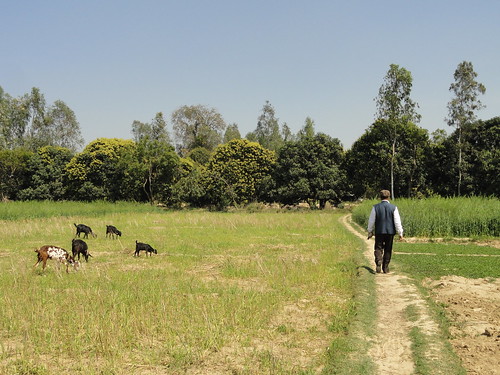
Jaitanpur: an hour away from state capital but years away from government services
For the past year, the Rotary Club International’s Lucknow branch visits this village of three thousand to provide free medicine for common ailments. Rotary Club of Lucknow Khaas Secretary Pramil Dwivedi, whose family owns most of the agricultural fields in the surrounding area, began a series of projects dating back to 2001 to provide aid to the poor residents of this depressed pocket of Uttar Pradesh.
Mr. Dwivedi ran a program for eight years where 250 liters of milk would be given to the residents of Jaitanpur to sell to local grocers. The money that returns from this milk would go to feeding cattle in the village and also providing money, clothing, and proper amenities to the village’s senior citizens.
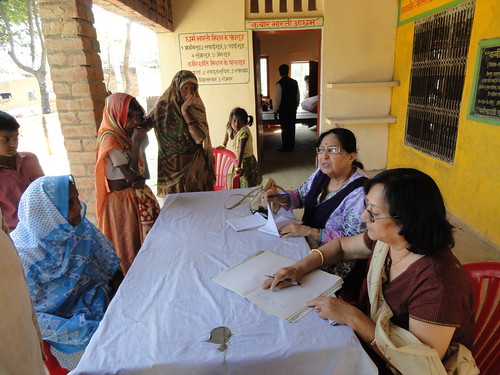
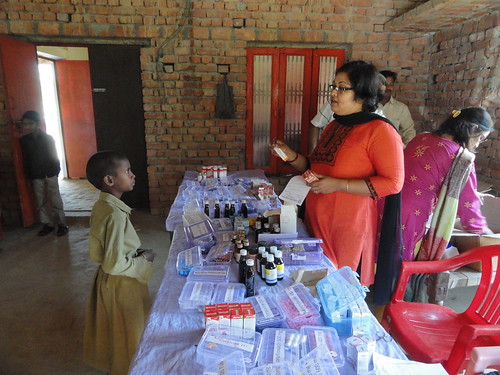
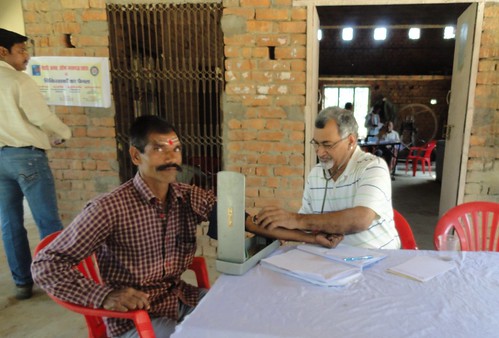
Mr. Dwivedi, who was born in this village, launches various projects for small-scale development. Another charity initiative he launched was to give merit-based contributions to the local workers in anywhere from 300 to 1,500 rupees. For example, a person who maintains the garden and weeds areas around the plant will receive 300 rupees for her work. If an individual is feeding cattle and milking then they will be compensated 1,500 rupees.
The gram pradhan, or village chief, Sohanlal Yadav, oversees the projects and keeps the residents of the town aware of the medical mission. Mr. Yadav, who is also an agricultural laborer, said that before this medical mission, there was no medical care in the village. Residents would travel to a hospital six kilometers away, which according to the residents was not well equipped.
“From the first time the Rotary doctors came, there was so much crowd that there weren’t enough medical supplies available for the number of people who came,” Mr. Yadav said. “Many people come for eye and ear ailments.”
When asked about the kind of problems they face in this community, Mr. Yadav focused on safety. “If someone travels from here to Kamlapur, then he has fear of getting robbed,” he said.
Another resident pushed in and said, “The biggest problems in our village are education, and health. The medical center nearby doesn’t have many funds. Agriculture, education, and health are not working well for us,” he said. He added that often the government does not provide clean water or seeds to grow crop, as they promise to provide. The gram pradhan said that mostly politicians come through the village to visit during election time but not otherwise.
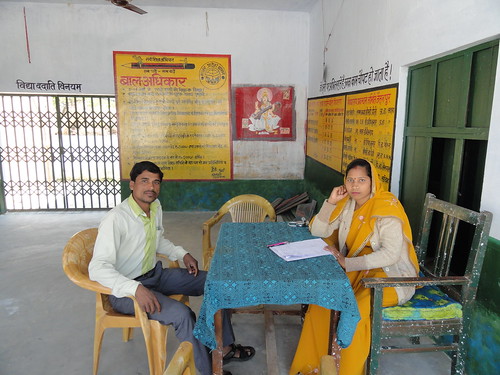
Collecting voter information in village school
Dalits, OBCs and Muslims form bulk of the village population. Though much of the village area grows wheat and sugar cane, the workers also grow mint, khatail, neem, and, of course, plentiful bhang plant grows wild. Mr. Dwivedi said many of the residents of the town sell goats. Each goat, he says, can produce three to four kids, twice a year. The kids sell for one thousand rupees. Therefore, each goat can be valued at up to 7,000 rupees every six months.
The area had one “school,” or a room, where seventy students of all ages learn under one government teacher, “but they mostly come for the midday meal,” a local said. On a Sunday in March, government presence was visible with two workers busy collecting information of all the voters in this village. This collection of information was in preparation for “the largest exercise of the democratic franchise in history.” In a few months this exercise will be over and Indian state and its governance will shrink back to its Parliament, assemblies and capitals.
After distributing medicine, the Rotary Club of Lucknow Khaas doctors make sure that each child repeats the instructions for dosage. The monthly medicine provides some relief to Jaitanpur, despite the day to day struggles the residents have with lack of access to education, water, and other basic necessities.

